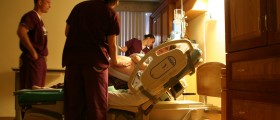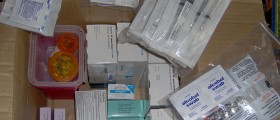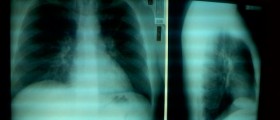
What Is Down Syndrome?Down syndrome is a genetic disorder and one of the most common causes of birth defects in people. An individual with Down syndrome has 47 chromosomes as a result of an extra copy of chromosome 21. Down syndrome is diagnosed in approximately 1 in every 800-1000 live births. The disorder hinders mental and physical development and may cause cognitive impairment as well as physical abnormalities in affected infants. The risk of having a child with Down syndrome increases with advanced maternal age. Down syndrome is also associated with other medical conditions such as heart defects, dementia, eye problems, hearing problems, hypothyroidism and problems with the intestines and skeleton.
Causes of Down SyndromeA baby normally inherits 23 chromosomes from the father and 23 chromosomes from the mother resulting in a total of 46 chromosomes. However, in case of Down syndrome a child inherits an extra chromosome 21. This extra chromosome is responsible for physical and mental delays that are associated with the disorder. Women aged over 35 years have much higher chance of conceiving a baby with Down syndrome.
Signs and Symptoms of Down SyndromeDown syndrome sign and symptoms can vary from person to person. The symptoms may range from mild to severe. Down syndrome is associated with around 100 physical features. However, children with this genetic disorder share certain characteristics, thus having a widely recognized appearance.
Common facial features of Down syndrome include a flattened face and flattened bridge of the nose, a short neck, upward slanting eyes, rounded inner corners of the eyes and a broad forehead. White spots on the iris, known as Brushfield spots, are common too. Children with Down syndrome usually have small and abnormally shaped head, small mouth, protruding tongue and small ears. Their hands are wide and short with short fingers and the little finger is curving inward. The palm of the hand is with a single, deep crease. First and second toe are widely separated.
Down syndrome is accompanied with low muscle tone or hypotonia. Affected children have hyperflexibile joints and weak reflexes. Delayed growth and intellectual impairment are also common in Down syndrome.
Associated Medical Problems
There are different health issues associated with Down syndrome. Children with this birth defect usually suffer from a congenital heart defect, childhood leukemia, gastrointestinal and respiratory problems. Increased susceptibility to infections is present due to lowered immunity. Epilepsy, thyroid problems like underactive thyroid, eye and hearing problems, obesity and different skin problems are usually present too.
Common heart problem associated with the syndrome is antrioventricular septal defect that requires lifelong monitoring and sometimes surgical treatment. Gastrointestinal disorders related to Down syndrome are annular pancreas, imperforate anus, anaglionic megacolon, esophageal motility disorders, gastro-esophageal reflux and malabsorption.

















Your thoughts on this
Loading...